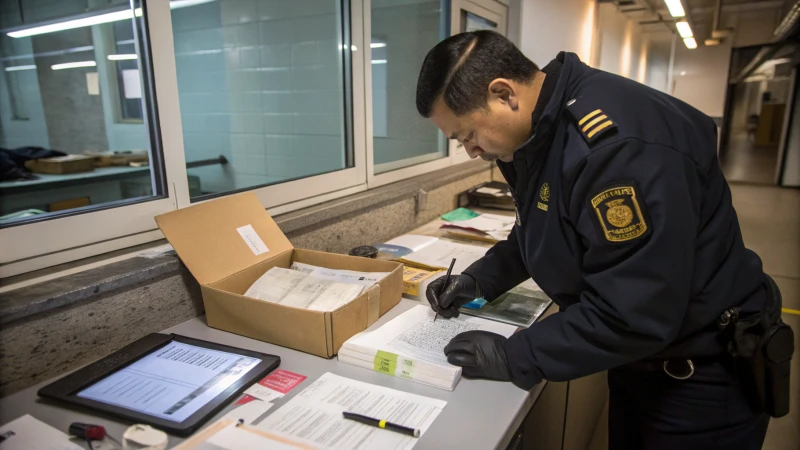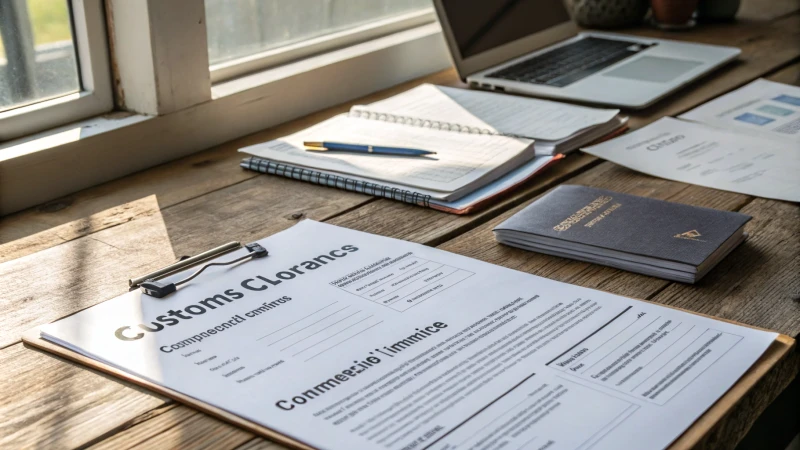When your package gets stuck in customs, it can feel like a rollercoaster of emotions—frustration, confusion, and a dash of impatience.
If your package is held by customs, start by contacting your shipping carrier to uncover the issue. Then, track the shipment online, gather all necessary documents like invoices and IDs, and pay any duties or fees required. For more complex situations, hiring a customs broker might be the way to go.
I remember the first time I dealt with this—it was like my shipment had disappeared into a black hole. Understanding why packages get held up and learning how to prevent future delays was a game-changer for me. Let's unravel these customs processes together and explore strategies that keep your shipments flowing across borders effortlessly. Whether it's dealing with missing paperwork or unexpected fees, knowing what steps to take can make all the difference in how quickly your goods get released.
Contacting the shipping carrier resolves customs holds.False
Contacting the carrier is a step but doesn't guarantee resolution.
Hiring a customs broker can expedite package clearance.True
Customs brokers are experts who can navigate complex procedures efficiently.
Why Do Packages Get Held by Customs?
Have you ever tracked a package only to find it's stuck in customs? It’s like being on a road trip and hitting an unexpected detour.
Packages are held by customs due to reasons like incomplete documentation, incorrect declarations, unpaid duties, or prohibited items. Understanding these factors can help mitigate delays and ensure smoother customs clearance.

Common Reasons for Customs Holds
As someone who's been in the import/export game for quite some time, I've had my fair share of packages taking surprise vacations in customs. It's not always obvious why this happens, but here are some common culprits:
| Reason | Explanation |
|---|---|
| Missing Documentation | Without the proper paperwork, packages cannot be processed. Always ensure invoice and permits1 are included. |
| Incorrect Declarations | Misdeclaring goods can lead to holds as customs need accurate information to calculate duties and assess regulations. |
| Unpaid Duties | If import duties and taxes are not settled, packages will remain in customs until payment is confirmed. |
| Restricted Items | Some items might be banned or require special permits, leading to delays. Check the destination country's import regulations2. |
Navigating Through Customs Delays
Over the years, I've picked up a few tricks to help navigate through customs snags:
1. Communication with Carrier
My first move is always to contact the shipping carrier. They usually have insights into why a package is held up and can guide me on the next steps.
2. Tracking and Documentation
Keeping an eye on the tracking system is crucial. I make sure all my documents, like invoices and ID proof3, are ready to go at a moment’s notice.
3. Understanding Duties and Taxes
I've learned to familiarize myself with the duty and tax obligations for each destination. Paying these early can save a lot of headaches later.
4. Hiring a Customs Broker
For those particularly sticky situations, bringing in a customs broker has been a lifesaver. They understand the ins and outs of regulatory requirements and can help get my package moving again.
By keeping these strategies in mind and staying prepared, I've managed to reduce many of the disruptions that can occur during shipping. These insights are especially crucial for anyone involved in import/export trade4, like myself.
Incomplete documentation causes customs delays.True
Missing paperwork prevents customs from processing packages promptly.
All items are allowed through customs without restrictions.False
Some items require permits or are banned, causing customs holds.
How Can I Prevent My Package from Being Held Again?
Ever had a package go MIA right when you needed it the most? Yeah, me too. Here's how I learned to dodge those annoying shipping holds.
To keep your package from being held, make sure all shipment details are spot-on, have the necessary paperwork ready, pay duties or fees quickly, and think about using a customs broker for tricky shipments.

Understand Shipping Requirements
Navigating international shipping can sometimes feel like deciphering a complex puzzle. I remember the first time I had to send something overseas; I was clueless about the destination country's regulations5. Each country has its own set of rules, and knowing these in advance can save you a lot of headaches later on.
Accurate Documentation
I once filled out a customs form in a hurry, and let’s just say, it didn’t end well. Missing or inaccurate details can cause serious delays. Now, I double-check every invoice, customs declaration, and any necessary permits. Using a document checklist6 has become my go-to strategy to ensure everything's in order.
| Document Type | Importance |
|---|---|
| Invoice | Validates value of goods |
| Customs Declaration | Details shipment contents |
| Permits | Required for restricted goods |
Clear Labeling and Packaging
Labels are like the GPS for your package—if they’re wrong, your package could end up on an unexpected detour. I’ve learned that clear labeling and sturdy packaging are essential. It’s not just about protecting what's inside but also ensuring it meets shipping standards.
Prompt Payment of Duties and Taxes
I used to underestimate how quickly duties and taxes could become a roadblock. Now, I research estimated costs ahead of time and make sure I'm ready to pay as soon as the package arrives. Tools like online calculators7 have been lifesavers for budgeting these expenses.
Work with a Customs Broker
For particularly tricky shipments, I’ve found that hiring a customs broker is worth the investment. Their expertise in customs procedures means they can handle all the paperwork, reducing the chances of holds.
Use Reliable Shipping Services
Choosing the right carrier can make all the difference. I’ve come to rely on companies like Gofreighter8 because they specialize in avoiding these kinds of problems, making sure everything goes off without a hitch.
By following these steps, I've managed to keep my packages moving smoothly, ensuring they arrive on time and keeping my business—and my customers—happy.
Incomplete documentation leads to package holds.True
Missing or incorrect details in documents can cause shipment delays.
Proper labeling has no impact on shipping delays.False
Incorrect labeling can cause delays, affecting delivery timelines.
What Documents Are Required for Customs Clearance?
Ever felt like you’re deciphering a secret code when dealing with customs paperwork? I sure have. Knowing exactly what documents you need is the key to smooth sailing.
For seamless customs clearance, ensure you have the commercial invoice, bill of lading, packing list, and necessary import/export licenses. These documents are essential for adhering to customs regulations and ensuring swift processing.

Understanding the Essentials
When I first started dealing with international shipments, the stack of paperwork felt daunting. Over time, though, I've learned that having the right documents on hand is like having a trusty map in unfamiliar territory. Here’s what you absolutely need:
-
Commercial Invoice: Think of this as your shipment’s ID card, detailing who’s buying, who’s selling, and the value of your goods. This document is a must-have to help customs officers understand the financials of your transaction.
-
Bill of Lading (BOL): This is essentially a handshake between the owner of the goods and the carrier, outlining what's being transported and where it's headed. It’s crucial for establishing ownership and responsibility.
-
Packing List: Remember those surprise gifts you open, only to find they’re not what you expected? Customs officials don’t like surprises either. This list ensures they know exactly what’s in each package.
-
Import/Export Licenses: Depending on what you're shipping, you might need specific licenses. I remember a time when I had to scramble for a last-minute export license—it wasn't fun.
Additional Documents for Specific Needs
Depending on the nature of your goods, additional documents might be necessary:
| Document Type | Purpose |
|---|---|
| Certificate of Origin | Verifies where goods are manufactured |
| Inspection Certificate | Confirms goods meet quality or safety standards |
| Insurance Certificate | Validates coverage in case of damage or loss |
Navigating Different Customs Regulations
Customs rules can feel like a moving target, shifting from one country to another. For instance, when I first shipped to the USA, I learned that additional customs declarations9 were necessary. Staying informed and perhaps consulting a customs broker10 can save you headaches.
The Role of Technology in Customs Clearance
Imagine a world where paperwork wasn’t a pile on your desk but just a few clicks away. Digital platforms are making this a reality by allowing electronic submissions. This is particularly handy if you’re juggling multiple shipments. I’ve found that services like digital freight solutions11 offer real-time updates and document tracking, which is a game-changer for managing my supply chain12 operations.
Having the right documents ready and leveraging tech tools doesn’t just make customs clearance easier—it makes it faster and less stressful. So whether it's electronics or other goods you're moving, being prepared will keep your logistics flowing smoothly.
A commercial invoice is mandatory for customs clearance.True
The commercial invoice details the transaction, essential for customs.
All shipments require an insurance certificate.False
Insurance certificates are only needed if coverage is necessary.
When Should I Consider Hiring a Customs Broker?
I remember the first time I tried to navigate international trade alone—it felt like deciphering a foreign language.
You should consider hiring a customs broker when you're navigating complex import regulations, dealing with high-value shipments, or facing delays in customs clearance. Brokers streamline processes, ensure compliance, and potentially save costs.

Navigating Complex Import Regulations
I learned pretty quickly that importing goods from multiple countries isn't just about finding the best deals. Each country has its own set of rules, and trying to keep track of them all was overwhelming. Hiring a customs broker13 became a game-changer. They provided expert guidance on international trade laws and ensured we stayed compliant with all necessary requirements.
High-Value or Sensitive Shipments
When I started importing high-value electronics, I realized the stakes were much higher. Accuracy in documentation became crucial because one small error could lead to costly delays or penalties. That's when a customs broker stepped in, ensuring all paperwork was spot-on and submitted correctly.
| Scenario | Benefit of Hiring a Broker |
|---|---|
| Importing high-value goods | Reduces risk of non-compliance fines |
| Exporting sensitive items | Ensures accurate documentation |
Delays in Customs Clearance
I remember being frustrated with constant delays at customs. It felt like my shipments were always stuck at the worst possible times. But when I brought a broker onboard, things changed. They had connections and knew how to resolve issues faster than I ever could.
For example, Gofreighter14, an experienced freight forwarder I work with, often uses brokers to tackle clearance hurdles, ensuring timely delivery.
Lack of Internal Expertise
Running a smaller business meant I couldn't afford to have a full-time team dedicated to navigating complex customs issues. That's where the customs broker became invaluable—acting as an extension of my team and offering insights tailored to our specific needs.
In conclusion, whether it's managing documentation or expediting the clearance process, hiring a customs broker15 was one of the best strategic moves I've made for achieving efficiency and compliance in our supply chain operations.
Customs brokers can expedite customs clearance.True
Brokers have relationships with customs officials, speeding up processes.
Hiring a customs broker is unnecessary for high-value goods.False
Brokers ensure accurate documentation, reducing risks of fines.
Conclusion
If your package is held by customs, contact your carrier, track the shipment, gather necessary documents, pay any fees, and consider hiring a customs broker for complex issues.
-
Learn about the essential documents needed for customs clearance to prevent delays. ↩
-
Understanding import restrictions can help avoid shipping items that may be held by customs. ↩
-
Discover how to correctly prepare your documentation for seamless customs processing. ↩
-
Find out how a customs broker can help simplify complex import/export processes. ↩
-
Understanding import regulations helps avoid shipment holds by ensuring compliance with destination country's requirements. ↩
-
A document checklist ensures all necessary paperwork is complete, minimizing risks of package delays. ↩
-
Calculating duties in advance helps prepare for payments, reducing hold risks due to unpaid fees. ↩
-
Gofreighter offers reliable services that help prevent shipment holds through efficient logistics solutions. ↩
-
Explores specific requirements for shipping goods to the USA, ensuring compliance with local customs regulations. ↩
-
Provides insight into situations where hiring a customs broker is beneficial for handling complex shipments. ↩
-
Offers information on top digital freight solutions that streamline logistics processes. ↩
-
Guides on effective supply chain management strategies for smoother logistics operations. ↩
-
Explore the comprehensive benefits of hiring a customs broker, including expert advice and compliance assistance. ↩
-
Learn how Gofreighter leverages customs brokers to enhance their logistics services and ensure timely deliveries. ↩
-
Understand the strategic advantages of employing a customs broker for efficient and compliant import operations. ↩




